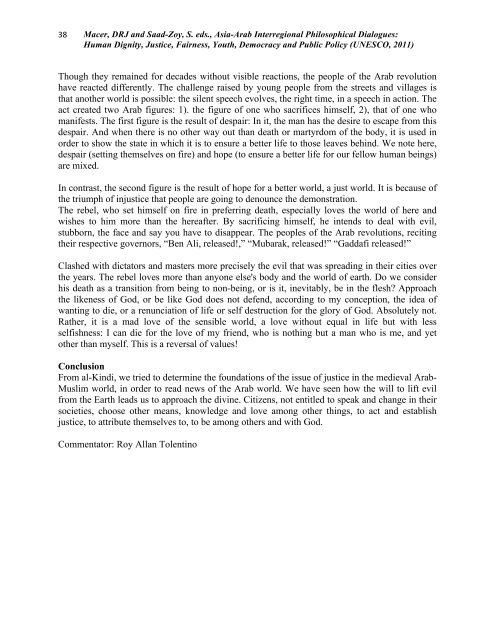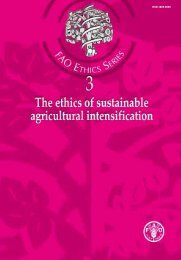Human Dignity, Justice, Fairness, Youth - Eubios Ethics Institute
Human Dignity, Justice, Fairness, Youth - Eubios Ethics Institute
Human Dignity, Justice, Fairness, Youth - Eubios Ethics Institute
Create successful ePaper yourself
Turn your PDF publications into a flip-book with our unique Google optimized e-Paper software.
38 <br />
Macer, DRJ and Saad-Zoy, S. eds., Asia-Arab Interregional Philosophical Dialogues:<br />
<strong>Human</strong> <strong>Dignity</strong>, <strong>Justice</strong>, <strong>Fairness</strong>, <strong>Youth</strong>, Democracy and Public Policy (UNESCO, 2011)<br />
Though they remained for decades without visible reactions, the people of the Arab revolution<br />
have reacted differently. The challenge raised by young people from the streets and villages is<br />
that another world is possible: the silent speech evolves, the right time, in a speech in action. The<br />
act created two Arab figures: 1). the figure of one who sacrifices himself, 2), that of one who<br />
manifests. The first figure is the result of despair: In it, the man has the desire to escape from this<br />
despair. And when there is no other way out than death or martyrdom of the body, it is used in<br />
order to show the state in which it is to ensure a better life to those leaves behind. We note here,<br />
despair (setting themselves on fire) and hope (to ensure a better life for our fellow human beings)<br />
are mixed.<br />
In contrast, the second figure is the result of hope for a better world, a just world. It is because of<br />
the triumph of injustice that people are going to denounce the demonstration.<br />
The rebel, who set himself on fire in preferring death, especially loves the world of here and<br />
wishes to him more than the hereafter. By sacrificing himself, he intends to deal with evil,<br />
stubborn, the face and say you have to disappear. The peoples of the Arab revolutions, reciting<br />
their respective governors, “Ben Ali, released!,” “Mubarak, released!” “Gaddafi released!”<br />
Clashed with dictators and masters more precisely the evil that was spreading in their cities over<br />
the years. The rebel loves more than anyone else's body and the world of earth. Do we consider<br />
his death as a transition from being to non-being, or is it, inevitably, be in the flesh? Approach<br />
the likeness of God, or be like God does not defend, according to my conception, the idea of<br />
wanting to die, or a renunciation of life or self destruction for the glory of God. Absolutely not.<br />
Rather, it is a mad love of the sensible world, a love without equal in life but with less<br />
selfishness: I can die for the love of my friend, who is nothing but a man who is me, and yet<br />
other than myself. This is a reversal of values!<br />
Conclusion<br />
From al-Kindi, we tried to determine the foundations of the issue of justice in the medieval Arab-<br />
Muslim world, in order to read news of the Arab world. We have seen how the will to lift evil<br />
from the Earth leads us to approach the divine. Citizens, not entitled to speak and change in their<br />
societies, choose other means, knowledge and love among other things, to act and establish<br />
justice, to attribute themselves to, to be among others and with God.<br />
Commentator: Roy Allan Tolentino

















